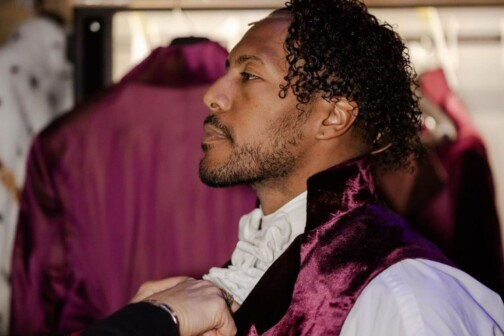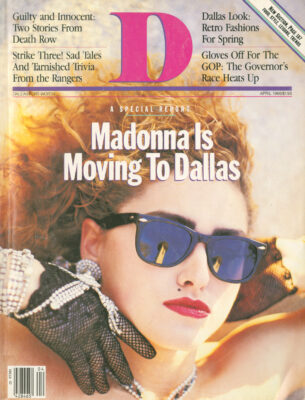THE TEXAS RANGERS need a hero. Boy, do they ever.
They hit one of their low points for the Eighties last May 16. Third-year manager Doug Rader was snapping at his players, the press, and anyone else within striking distance. The Rangers had lost six in a row and eleven of thirteen to settle into last place for what appeared to be a long time. Owner Eddie Chiles resorted to a familiar standby move: he fired the manager.
The new skipper, Bobby Valentine, could hardly wait to make his first move. On his second day on the job, as if by divine intervention, he got his chance: when outfielder Tommy Dunbar was placed on the disabled list, Valentine quickly brought up Od-dibe McDowell, a twenty-two-year-old kid from the Rangers’ Triple-A farm team in Oklahoma City. A lot of Ranger fans had been expecting the move, and they were grateful. Oklahoma City spoitswriters also breathed a sigh of relief, having exhausted their supply of superlatives for the kid, who was hitting .400 with fifty hits and thirty-two runs scored in thirty-one games.
McDowell is compact and muscular; physically, he’s been compared to Joe Morgan, Al Bumbry, and, yes, Willie Mays. With lead-off speed and shocking power, he’s a centerfielder who plays shallow enough to prevent the bloop single but still gets back for the fly on the warning track. And although he is almost painfully shy and soft-spoken, he knows all this about himself.
“I can do it all,” he says, ’if I stay healthy.”
Now twenty-three, after a star-crossed year in the majors that had the Rangers front office feverishly promoting him for Rookie of the Year honors, Oddibe (pronounced OH-da-bee) McDowell is poised on the brink of stardom. If long-suffering Rangers fans have one coming to them after all these years of disappointment, then McDowell’s lazy grin and dazzling play should be Ranger trade-marks for years to come. But McDowell will never conform to our traditional image of a sports hero. He’s neither the cocky and glib Tony Dorsett model nor the stolid and reverent Tom Landry unit. He’s as sure of himself as Dorsett without the brashness; as devout as Landry without the occasional piousness.
McDowell’s silence could prove frustrating to reporters, but he is secure enough in his abilities to realize he doesn’t have to give up big chunks of himself to prosper. He should become more at ease with the press as time goes by, but he will never be another Dextor Clinkscale, the Cowboy safety who dispenses quotes like the Arlington Stadium vendors dispense Cheez Whiz nachos. That confidence will serve McDowell well on the diamond. “He’s not a wall-climber,” says Ben Hines, a former assistant coach at McDowell’s alma mater, Arizona State, and now a hitting instructor with the Los Angeles Dodgers. “He’s not going to climb the walls after he has a bad day. He won’t let things get to him. I think that will help him develop into a good clutch hitter, among other things.” All of which is a polite way of saying that Rangers fans will probably have to get their kicks out of watching Oddibe-not listening to him. But that’s all right. If you’re not watching Oddibe, you’re missing him altogether.
Baseball is normally the best of sports to enjoy on the radio, but make an exception in McDowell’s case. He’s not like any other player in the game today. There is a spring in his step that comes from, he says, “playing basketball every single day of the year, regardless of what season it was.” When he settles into the batter’s box, you can see the stealth and fluid motion that brought him two Florida high school state wrestling championships. He moves as if animated by Michelangelo. After McDowell went three-for-four with a grand slam in his first major league exhibition game last spring, many observers assumed he’d be the first player since Bob Horner in 1978 to make the jump from college straight to a major league team. After all, he had been turning down pro offers since his sophomore year at Miami-Dade North Community College, later opting for the strong college competition at Arizona State University and the U.S. Olympic Team.
McDowell says he believed his 1985 spring training season was good enough to earn a spot on the big club. Ranger fens, who had sat through the 69-92 horror of 1984, began to see him as a glimmer of hope. Spring statistics can be deceiving, of course, but when a team is struggling to get out of the cellar a young talent of McDowell’s caliber is hard to ignore.
Doug Rader said McDowell had “good skills.” “But he’s also got twenty-twenty vision,” Rader added, implying that Oddibe could see the writing on the outfield wall: Larry Parrish in right, Gary Ward in left, George Wright in center-and McDowell in the minor leagues, probably with the Rangers’ Double A team in Tulsa. Eventually, Rader was sufficiently impressed to send McDowell to Oklahoma City, just one rung below the majors. Says Bobby Valentine: “I think 95 percent of the baseball community would have said, ’Keep him in the minors his first year.’ Fortunately the other 5 percent was here in Texas.” In addition to stealing twenty-five bases in thirty-two tries for Valentine, McDowell hit eighteen home runs in 406 at-bats, far and away the best power ratio on the club. His five-foot-nine, 160-pound frame conceals surprising strength. Demie Mainieri, McDowell’s coach at Miami-Dade, speaks reverently of a McDowell homer that has become legend in Florida junior college baseball. Aided by a slight wind, the blast earned more than 500 feet, clearing a large stand of palm trees. McDowell’s physical strength may be exceeded by his strength of character, according to those close to him. Arizona State head coach Jim Brock once violated a team rule against swearing and was called on the carpet by McDowell, who forced him to run laps-the punishment Brock himself had assigned for the violation. McDowell grew up in a family that believed in religion and hard work. Oddibe’s parents constantly admonished him to work on his studies, and Oddibe obeyed them. “He is one of the finest young men I have ever coached,” says Valentine.
One thing is certain: Oddibe McDowell has as much potential as any player in baseball today. His throwing arm is rated as average, but his other weaknesses are those of a younger player learning his way around the major league curveball. McDowell struck out eighty-five times last season while drawing just thirty-six walks-not textbook numbers for a leadoff man hitting .239. Six weeks into his tenure as Rangers leadoff man, he was hitting .190 and was mired in a two-for-twenty-eight slump. Then, breaking out of the slump, McDowell let the world know he belonged on charter flights, not bus rides. On July 24 he went five-for-five and hit for the cycle (a single, double, triple, and home run), beginning a streak that ran to eight straight hits and brought him the AL Player of the Week award. He slumped again later, baffled by some curve balls, but closed strong (.303 in his last twenty-nine games), despite a nagging hamstring pull. McDowell just missed becoming the first rookie ever to hit twenty homers and steal twenty bases while playing just part of a season. His fourth-place finish in the Rookie of the Year voting is evidence that the award is not presented on potential.
Of course, there are no guarantees that Oddibe McDowell will lead the Rangers to a pennant, or even hit .300 in the major leagues. The spring hopes and dreams of many a Ranger fen have been dashed on the rocks of summertime reality. Certainly it is too much to expect this young outfielder to singlehandedly reverse the fortunes of this floundering ballclub. But the Rangers needed a hero, and now they have one. And hey, it’s spring. On Opening Day, everybody’s in first place.
Get our weekly recap
Brings new meaning to the phrase Sunday Funday. No spam, ever.
Related Articles

Arts & Entertainment
Hamilton Returns to Dallas, and TCU Grad John Devereaux Wears Many Hats
On one night, the George Washington role is calling. And on the next, the King George role might need to be filled. When a spot opens up, it's Devereaux's time to shine.
By Brett Grega

Home & Garden
Level Up Your Poolside Party Game This Summer With Four New Burger Recipes
Find exclusive recipes from the minds behind Burger Schmurger, Liberty Burger, Parigi, and Rodeo Goat.
By Lydia Brooks

Commercial Real Estate
What’s the Key to Attracting Talent? Three Frisco Developments Offer Answers
Developers behind Frisco Station and Fields reveal detailed updates—and city officials provide a sneak peek of redevelopment plans for Frisco's downtown.


